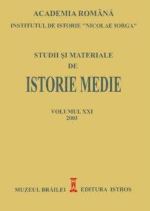Familie şi sentiment în Vechiul Regim românesc. Note pe marginea testamentului lui Radu Goran Olănescu
Family and Sensitivity in the Romanian Ancien Regime. Remarks on the Last Will of Radu Goran Olănescu
Author(s): Gheorghe LazărSubject(s): History
Published by: Institutul de Istorie Nicolae Iorga
Summary/Abstract: The family and the multitude of research perspectives connected to it are, despite the encouraging steps taken during the past years in this direction, still an area to be explored. One of the possible explanations for this lack of attention could lie in the scarcity of primary sources especially with regard to the typology of sources utilized in the West-European literature. Therefore, the few extant last wills represent a most valuable source for exploring the family and its functioning in the Romanian past. The last will of Radu Goran Olănescu, a descendant from a prominent Wallachian noble family, is an outstanding document for the eighteenth century on account of both its contents and its length. The testament has several additions made in subsequent years from its first writing in 1755. The short preamble comprises the specific religious justifications and formulae particular to this type of primary source. Beside the usual provisions regarding the administration of the wealth, the testament reveals significant details with respect to the relations and solidarity within the testator’s family. A great emphasis is put on the father’s caring words and parental advice to his ill son from the second marriage. The ritual requests which were to be carried out after the testator’s death are the expression of his religious sentiment and a statement of his social and economic status as well. “Pentru Vechiului Regim românesc familia şi aspectele ce ţin de aceasta, în ciuda unor paşi promiţători realizaţi în ultimul timp, rămâne în continuare un domeniu puţin explorat în istoriografia română1. Pe lângă multe alte cauze ce pot fi invocate şi care au determinat această situaţie, lipsa izvoarelor utilizate cu predilecţie pentru acest tip de cercetare (cronicile de familie, corespondenţa între membrii aceleiaşi familii, dacă ar fi să comparăm cu realitatea documentară din Europa Occidentală) şi profundul caracter patrimonial al documentelor medievale ce ni s-au păstrat de-a lungul timpului, reprezintă de departe piedica principală. În aceste condiţii, testamentele, în ciuda numărului mic care au ajuns până în zilele noastre, reprezintă unul dintre puţinele izvoare documentare care ne pot oferi detalii asupra familiei, modului ei de funcţionare şi mai ales asupra sentimentelor care au caracterizat viaţa familială[…]”
Journal: Studii şi Materiale de Istorie Medie (SMIM)
- Issue Year: 2003
- Issue No: XXI
- Page Range: 47-56
- Page Count: 10
- Language: Romanian
- Content File-PDF

